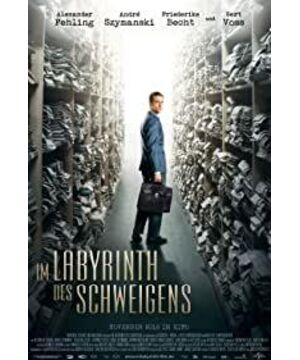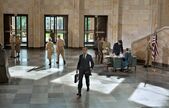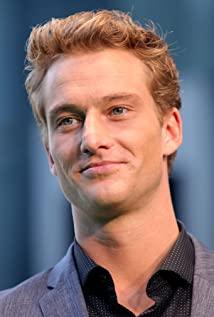It is sometimes easier to choose to remain silent than to tell the truth. But there will always be someone who wants to lift that lid, after all, pretending that nothing has happened in the past with silence can't last. In The Labyrinth of Silence, young Frankfurt court prosecutor Johann is the one who accidentally lifts the lid. He was originally just a young staff member with very little qualifications, and at most he could handle some traffic violation prosecutions. By chance, he met a reporter. The other party shouted and claimed to have seen a Nazi officer in Auschwitz who still lives in freedom and even works at the school.
This is West Germany in 1958, and after the war, things are looking good. People who have just come out of the haze all have a common psychological foundation - they want to choose to forget the past and look forward. To a certain extent, you can't blame them, this is a common human survival instinct. But the young prosecutor Johann could no longer pretend to ignore everything. He began to look for information about Auschwitz, asking people around him, only to find that those who lived through that history kept everything secret, while the younger generation had never heard of the camp's name. He began to frantically fall into the work of deciphering the cocoon, trying to explore the truth of the past.
If that's all the story is, then this is nothing more than a mediocre reflective film. But what is quite significant is that the young judge slowly discovered that the world he was in was not a confrontation between good and evil, but black and white, and he fell into an unspeakable maze. The Nazis, in his view, were originally evil enemies, and he was the embodiment of justice, but in the end, he knew a little bit that the Nazis were inextricably linked to this post-war rising country, including himself.
The process of collecting evidence was set up with many obstacles, some of which came from colleagues around him. Those people aren't "bad guys," they just see it all with a more complex mindset. The questions that those people asked were very intriguing, like, "What would you do if you found out that most of the people in this country had been associated with the Nazis?" It was almost torture, because at that time, many people had no choice, had to, or were in a strategic position. Considering that, after joining that huge organization, more or less, many people are closely related to that system. Others laughed at the naivety of this young man, "Did you think that when Hitler died, all Nazis would disappear automatically?" Yes, this is even more meaningful. After Big Brother dies, will the world automatically change for the better? The world needs a little repair. Those who participate in the evil system will not automatically burst like a bubble, nor will they become kind in an instant, they will hide in every corner and live an ordinary life. Just like in the movie, Johann found the trail of a Nazi official, and he couldn't help but to see what kind of person the "devil" in his heart was. After seeing him, he found out that now, he opened a bakery, with a kind smile every day, driving a dilapidated truck to deliver goods, seeing children and pinching each other's cheeks, seeing Johann and reporters visiting, Also gave them a loaf of bread. The picture is ironic and cruel. Demons among humans do not have horns. Our evils are hidden in our hearts, and when they are inspired, the evils shroud us, and when they are hidden, we turn into ordinary people. This is true human nature, complex, ambiguous, and elusive.
"The Labyrinth of Silence" sets up layers of psychological progression. At the beginning, Johann challenged a collectively covered history as a lone hero. Later, he gradually realized that his understanding of history and truth was too superficial. But that's not all, the movie takes a brutal progression to another level. As the investigation deepens, Johann discovers that not only people from all walks of life have been linked to the Nazis before, but also the honest journalists who have always fought by his side, and to his dismay, his respected father , even has an inseparable connection with that evil system. For a kind, upright, and innocent young man, it's a bit too cruel to understand. But that was the postwar reality the Germans had to face. It is also the mental preparation that every nation that has experienced a cruel history must do well.
Whether it is Johann himself, or those who obstruct his investigation, it is actually for a better life, or, on a grander level, to put this devastated country on the right track as soon as possible, but forgetting and covering up cannot Solve the problem, and even, that will bring about even greater consequences. Silence is an instinctive defensive psychological mechanism after trauma, but telling the truth and paying off guilt are the braver and more responsible choices. Everyone in this movie is in a labyrinth of silence, and it is only because there are still people who insist on pursuing the truth and breaking the silence that a path to the exit of the labyrinth is opened. Resisting the harsh reality, and still seeking the truth, is the true signpost in the labyrinth, both for a nation and for the rebirth of people's hearts.
(Text / Yang Shiyang)
View more about Labyrinth of Lies reviews











